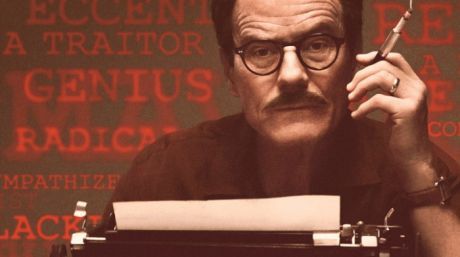Arts
You are here
Trumbo trivializes McCarthy terror

December 14, 2015
Revisiting the days of the McCarthy witch-hunt is relevant today. In the 1940s and 50s anti-communist hysteria fueled support for the permanent arms race of the cold war; today the same tactics, substituting Muslims for Commies, justify an endless “war on terror”. In that context, it is a shame that the makers of Trumbo chose to crank out a feel-good, Hollywood-friendly biography that ends up trivializing the McCarthy terror.
The problems of the films politics are rooted in the same thing that makes it a mildly successful bit of fluff–the choice of Dalton Trumbo as protagonist.
Trumbo was an eccentric whose heart was generally in the right place. Perhaps his greatest achievement was the classic anti-war novel Johnny Got His Gun, written in 1939; he also asked his publisher to keep the book out of print during WWII. He was a supporter of unionizing in the film industry; he was also Hollywood’s highest-paid screenwriter before he was blacklisted, living in a luxurious estate with private lake.
Trumbo was one of the “Hollywood 10”, a group of writers, producers and directors who were members or supporters of the American Communist Party. But the film barely glosses over their politics, the reasons the American Communist Party grew through the 1930s, and the reasons many of them later left the CP.
Instead it revels in Trumbo’s eccentricities: his practice of writing naked in his bathtub, his ivory cigarette holder, his prodigious use of whiskey and amphetamines, the pet parrot that perched on his head. It is almost as if his political affiliation was just another personality quirk. TV veteran Bryan Cranston hams it up as Trumbo, but that is what this shallow script demands. The presence of director Jay Roach, whose credentials peak with the Austin Powers movies, should be a warning.
In real life the Red Scare and witch-hunts destroyed thousands of lives, wrecked families and drove many to suicide. In factories across the country union activists, some CP members and others just allies, were literally beaten and driven from their workplaces by gangs of thugs organized by the bosses. For the key to the fatal weakness of trade unionism in the US, look no further than the Red Scare.
According to the movie, for Trumbo it was more of an inconvenience than mortal danger. His brief time in jail is notable because he is forced to do some physical labour and be brow-beaten by a proud black man. He is forced to sell his estate with the lake and move to a suburban home with backyard pool. He has to work long hours cranking out pot-boiler scripts to sell through fronts and under pseudonyms. He becomes cranky and has fights with his adoring wife and daughter. Big deal.
Trumbo won two screenwriting Oscars during that time, and that news became an open secret in Hollywood. His strategy to “break” the blacklist seems more about getting his awards than seeking justice.
In 1960, both director Otto Preminger and actor Kirk Douglas used their clout to publicly give Trumbo credit for Exodus and Spartacus. For a few high-profile individuals the blacklist was over. For the majority, including others of the Hollywood 10, it never ended. Albert Maltz, a fine writer, was forced to use pseudonyms until the end of his career in the late 1970s. Lester Cole, who co-founded the Writer’s Guild union, was forced to put a fake name on Born Free, more than six years after Trumbo “broke” the blacklist.
In 1970 Trumbo made a speech to the Writer’s Guild in which he argued that everyone, the people who informed and ratted on their workmates and friends and those who were blacklisted, were equally victims. The film ends with this speech, everything is healed, and Hollywood lived happily ever after.
Except of course that it didn’t. The speech was denounced by others of the Hollywood 10 as liberal nonsense. And so, I’m afraid, is Trumbo.
I prefer to give the last word to Albert Maltz: “How he can ... present his doctrine that there were ‘only victims’ I cannot say–but he does not speak for me or many others. Let it be noted, however, that his ethic of ‘equal victims’ has been ecstatically embraced by all who cooperated with the Committee on Un-American Activities when there were penalties for not doing so.”
Section:










